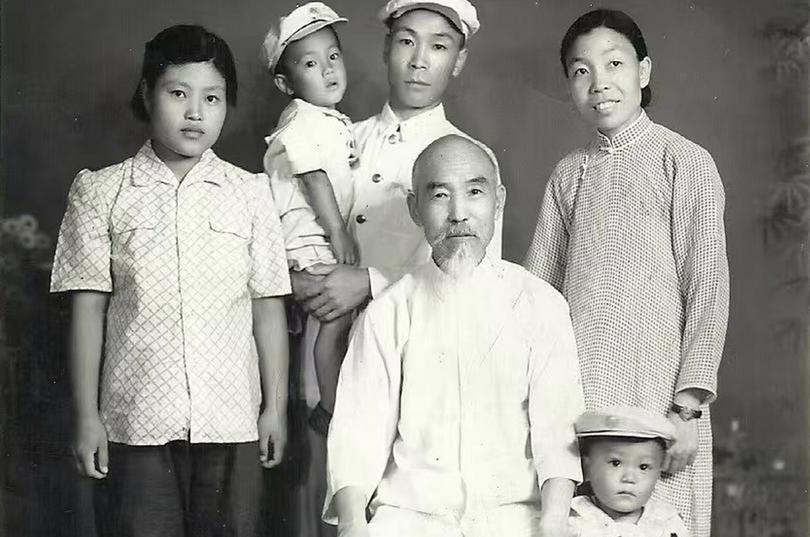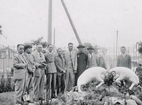It was at the beginning of the twentieth century, on one of the streets in Tangyin County, Henan Province, that a foreign missionary was preaching the gospel passionately before a large table. He was surrounded by listeners who were skeptical and disdainful, while some children dug under the table and plucked the hairs from the speaker's legs. Dogs barked from time to time. Also, among the crowd was the young proprietor of a rich local family (the Sus). To the young man's surprise, his life trajectory changed drastically because of the foreign missionary.
The missionary was Jonathan Goforth (1859-1936), a famous Canadian Presbyterian missionary and evangelist who led a great spiritual revival in the northeast region of China. The young man, the "Abraham" of the Su family, was Su Faquan. He was the grandfather of Rev. Su Lianen, a retired faculty member of the Nanjing Union Theological Seminary. Rev. Su Lianen worked as a class teacher at the early stage of the seminary's resumption. He taught Chinese church history for many years and used to work for its library and participated in logistic work. Now, he continues his academic research even after his retirement.
Recently, the Gospel Times, an online Chinese Christian newspaper, interviewed Rev. Su about the faith journey of their big family.
At that time, the Su family was one of the richest families in Tangyin County, Anyang, Henan Province. The famous Su Lane is named after them. As a young proprietor, Su Faquan, smart and capable, was the head of the family business, and his wife was also from a rich family.
The arrival of Goforth broke his quiet life. At that time, Anyang was Goforth's missionary base in Henan Province. He continued to spread the gospel to Anyang, including Tangyin County, where the Sus was located. At first, Su Faquan did not care about his message. However, due to some troubles encountered in his life, he would often come over to listen to the missionary. He had no worries about material life, as he was the master and owner of the accumulated properties of his ancestors. Because he didn't need to toil to make ends meet, he lost his motivation to improve himself. In addition, his father was idling away time by committing frequent gambling, so he needed to help his father pay off his gambling debts.
Su Faquan had studied in private schools and was a cultured man. He would often discuss some profound topics with Goforth: How wass the God you speak of different from the Chinese gods? How did everything in the world and people come to be? In less than 100 years, what wass the meaning of life? From their communications, Su gradually accepted the Christian faith and became a Christian (he changed his name to Su Quanting after his conversion).
After some time, Goforth planned to leave Henan Province for the northeast region. Su Quanting could not bear to see him go and even thought of going with him for mission. However, Goforth told him that he could not do the work because he could not endure the suffering. For the sake of evangelism, Goforth had indeed suffered tremendously. He had been treated with hostility and insults. He was driven away by people throwing dirt, dung, and stones at him. Once, his head was hacked off with a knife by members of the Boxer Rebellion, and he had almost lost his life. Nevertheless, Su was not deterred and was determined to go with him.
Yet, he was a married man and had such a large family business to manage. It wasn't as easy as he wanted. Fortunately, Su had a great relationship with his wife. He first discussed it with his wife, who was a lady from a wealthy and well-respected family. She used to listen to Goforth preaching in a sedan chair. She supported her husband's decision. The biggest obstacle, however, came from Su's father-in-law, who adamantly opposed the decision: "What are you doing with that foreign devil in the northeast? You can go if you want to, but don't take my daughter with you. You go by yourself!" In those days, the father had absolute authority in the family, not to mention that Su's father-in-law was also a high-ranking local official. It seemed almost unworkable. However, they did not give up. After his wife's continuous efforts, his father-in-law finally had to agree to the matter. So, he assigned his family business to the managers. In 1927, Su took his wife, sister, son, and daughter to set off for a brand-new life in the northeast, which was more than 1,000 kilometers away.
Rev. Su Lianen can still remember some of the scenes of the moving as told to him by his elders, "At that time, there were not even pedicabs, nor donkeys or house carts. It seemed that only my grandmother had a sedan. My father and my aunt were four or five years apart. A picker with two large frames, one on each end of the long carrying bar, carried them to the train station." At that time, there were already trains, but the conditions were terrible. "That train had no windows, and it was like a stuffy can. My grandmother said she sat in it for three days and three nights, during which time the light broke once."
After arriving in Siping City, Jilin Province, Su Quanting began to preach the gospel with Goforth. The message preached at that time was very simple: believe in the Lord, believe in the Lord for heaven and eternal life, do not sin, confess your sins and repent, etc. Although the message was simple, it was preached in a special way: the preacher slapped the table with a wooden bar then sang with a long, drawn-out voice: "God - love - the world..."
After a while, Su realized that the road of evangelism was indeed as hard as Goforth had said. However, unlike what Goforth had predicted, he endured the hardship. At that time, he was constantly on the move, and he wore out a pair of his wife's hand-knit shoes every month. The salary was 40 silver dollars a month (not much at that time), which was not enough to cover the expenses of the family. Sometimes the missionaries would get extra grants. Such a life was a far cry from his previous life as a rich man. What he did not expect was the unexpected blessing that came to him because of giving up the rich family fortune.
Not long before the liberation in 1949, Su returned to his hometown to visit his extended family. Tenants came to pay the household rent and land rent, but he canceled them all. Tenants were deeply moved and said he was a great benefactor. When he returned to the northeast, tenants saw him off with tears. Soon after his return, the liberation of the country was ushered in, and then came the land reform. At that time, Su was very anxious, fearing that he would be classified as a big landlord and capitalist because of his wealth status before the liberation. However, when he explained the time, process, and result of the disposal of his house and property, the cadres in charge of the agrarian reform said that he did not have any house or land, and he was not even a poor peasant, but a hired peasant. As a result, he was able to get through the later campaign of fighting landlords and dividing up the land in peace.
Thanks to his dedication in northeast China, his ministry there bore much fruit: he was ordained as a pastor and established more than 90 churches in his lifetime. Not only did Su make great achievements in his career, but as the "Abraham" of faith in his family, some of his descendants continue to rise to serve the Lord. His daughter, Rev. Su Saiguang, is a well-known pastor in Jilin Province, and has served as a member of the Standing Committee of CCC&TSPM, a board member of the Northeast Theological Seminary, president and chairperson of Jilin CC&TSPM. The great-granddaughter, Rev. Su Xing, is currently serving as the senior pastor of the West Fifth Road Church, Changchun, which has a history of more than a hundred years.
Looking back at his grandfather's life, Rev. Su Lianen said with emotion, "Grandpa followed Christ's example and laid up his treasures in heaven, and we, the younger generation, shall follow our ancestor as they followed Christ, be the light and salt, love our country, love our church, glorify God and benefit people, and make a good testimony for God in front of men."
- Translated by Charlie Li












